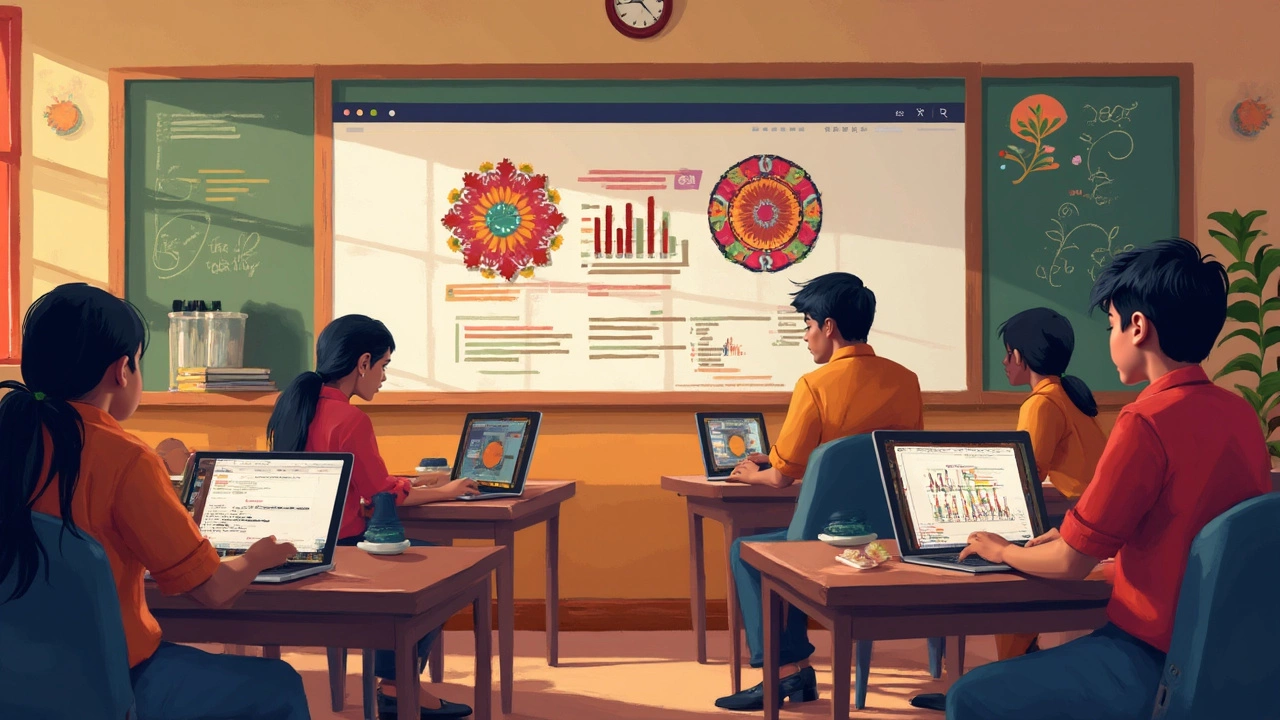
Should I Learn Python or HTML First?
Deciding between learning Python or HTML first can be a bit like choosing your ice cream flavor without ever having tasted any. Both are popular, both are useful, but they serve distinct purposes. If you've been eyeing the coding world, you're probably wondering which path to start down.
Let's break it down. If you’re thinking about building web pages, HTML is where you start. It's the skeleton of any website, marking up content so browsers can display text, images, and links just the way you want. It’s like laying down the framework for your dream house.
On the other hand, Python is the Swiss Army knife of programming languages. With its clean and simple syntax, it's a hit among beginners. But don’t let its simplicity fool you—this language is powerful enough to handle web apps, automate tasks, or even dabble in data science. If you’re hoping to dive into the technical aspects right away, Python might be calling your name.
- Understanding Python and HTML
- Career Paths with Python
- Career Paths with HTML
- Ease of Learning
- Project Goals and Interests
- Final Recommendations
Understanding Python and HTML
Diving into the world of coding can feel like stepping into an entirely new zoo, where each animal represents a different language with its quirks and purposes. Two of the most popular languages to begin with are Python and HTML. But what's the deal with each?
Let's start with HTML, which stands for HyperText Markup Language. It's essentially the backbone of the web. HTML gives structure to web pages by using a system of tags and attributes. It tells your browser how to display content properly, whether it's text, images, or links. So, if you're aiming to create visually appealing websites, HTML is your go-to starting point. No programming logic needed—just a knack for design and a set of tags.
Python, on the flip side, is a general-purpose programming language known for its simplicity and readability. It's not tied to just one type of project—you'll find it in web development, automation, data analysis, machine learning, and even game development. It's praised for its straightforward syntax, which makes it easy for beginners to grasp yet robust enough for advanced projects.
A cool fact about Python: it's one of the most popular languages used by data scientists. Companies like Google and Spotify use Python for its powerful data processing capabilities, which says a lot about its flexibility and power.
Here's a quick snapshot of how these languages compare:
| Language | Purpose | Complexity |
|---|---|---|
| HTML | Web page structure | Low |
| Python | General-purpose | Variable, but beginner-friendly |
You should think about your end goal before deciding which of these languages to dive into first. Are you picturing yourself as a web designer, or do you see yourself analyzing data sets? Your dream projects will guide this decision.
Career Paths with Python
So, you're pondering whether to dive into Python. Great choice! This programming language isn't just versatile—it's downright essential in many tech fields today. Whether you're eyeing a role in web development, data analysis, or even artificial intelligence, Python can open those doors for you.
First off, web development. Python's got a solid reputation here, thanks to frameworks like Django and Flask. These tools help developers build robust web applications efficiently. Imagine crafting everything from simple blogs to complex database-driven websites. Python makes it possible.
Then, there's data analysis. With companies swimming in oceans of data, someone needs to make sense of it all. Enter Python. Libraries like Pandas and NumPy transform raw data into insights, while Matplotlib and Seaborn help visualize trends and patterns beautifully. Whether you're in finance, healthcare, or marketing, data isn't just numbers—it's valuable, actionable information with Python at the helm.
And let's not forget machine learning and AI. Python's the go-to language here, thanks to tools like TensorFlow and PyTorch. You can build models that predict outcomes, automate tasks, or even recognize faces. It’s cutting-edge stuff, and Python’s your ticket in.
Job Opportunities
Check this out: Python ranks consistently as one of the most in-demand languages in job postings. From small startups to tech giants like Google, employers are seeking Python skills with open arms. Roles range from data scientists and software engineers to machine learning specialists. It's like a buffet of options for coders!
So whether you're fresh out of college or contemplating a career switch, Python is a smart move. It’s not just about the language itself, but the vast universe of career possibilities it brings.
Career Paths with HTML
HTML might seem simple, but don't underestimate its power in shaping your career. You start with HTML if you want to break into web development, as it's the foundation of every website you've ever visited. As you get comfortable, you'll find yourself naturally progressing to CSS and JavaScript.
With a solid understanding of HTML, you can venture into roles like Web Developer. These folks bring websites to life, making them not just functional but also beautiful. They ensure that users can navigate the site easily and enjoyably.
If design is your jam, then HTML paves the way to become a Web Designer. You'll craft stunning websites with eye-catching layouts. And if you're inclined to create content, there's room for you as a Content Manager, ensuring everything looks ace online.
HTML skills are also valuable in the SEO world. As an SEO Specialist, you'll tweak HTML tags to improve search engine rankings and drive more traffic to sites. That’s how you get websites noticed by search engines!
For those interested in a technical side-hustle, HTML can lead you to freelance gigs. Businesses constantly seek talent to create or revamp their sites, offering plenty of opportunity to showcase your skills anywhere, anytime.
| Position | Average Salary (USD) |
|---|---|
| Web Developer | $69,000 |
| Web Designer | $55,000 |
| Content Manager | $58,000 |
| SEO Specialist | $52,000 |
HTML opens a lot of doors. While it won't solve complex algorithms like Python, it's your ticket to entering and understanding the digital world, setting you up for an ever-expanding range of opportunities.

Ease of Learning
When it comes to ease of learning, diving into HTML is like dipping a toe into the coding pool. It's one of the most straightforward languages to start with. With a bunch of easy-to-remember tags, you could be crafting your first web page in a matter of hours. The simple structure makes it perfect for beginners who want to see real results fast. In fact, all you really need is a text editor and a web browser to get started.
On the flip side, Python is famous for being beginner-friendly too. Its syntax is clean and readable, so you won’t be tangled up in complex coding rules early on. According to Guido van Rossum, the language's creator, “Python is designed to be useful in a wide variety of contexts, yet simple enough that it can be applied to rapidly create small, simple programs.”
Python forces you to write consistently and understand what you’re doing, which makes it one of the best choices for newbies. - A software developer's insights
Still, one thing to consider is the learning curve. While HTML gives you instant web page gratification, Python opens the door to a wider range of projects, from data analysis to game development. It’s inspiring, but expect to invest a bit more time if you want to create something substantial.
So, if patience isn’t your thing and you’re just itching to get some web pages up and running, grab HTML by the horns. But if you're aiming to get the hang of a language with broader applications, Python is your best bet. Who knew choosing your first language could be this much fun?
Project Goals and Interests
Before jumping into coding, it’s important to think about what you actually want to do with your skills. Your project goals and interests can significantly influence whether to kick off with Python or HTML.
Are you riveted by the web's visual aspect? Do you get excited about crafting beautiful layouts and seeing them live on a browser? Then HTML, along with CSS and JavaScript eventually, might be your best bet. HTML is all about creating the structure of web pages, and it's a must-have if you're heading into web design or front-end development.
But suppose you've got a knack for logical problem solving or dreams of developing web apps, analyzing data, or even studying AI? Python might be your language. It's widely used in back-end development and data science. Imagine you're creating a smart app—Python's libraries can help you whip up functionality in no time.
Here’s a little tip: Consider starting with HTML if your immediate goal is to get a tangible website out there quickly. However, if you’re more interested in understanding programming concepts or jumping into diverse tech fields, start with Python. Your goals are like your compass. Let them guide your decision, and you'll be on the right track.
Final Recommendations
So, should you start with Python or HTML? It really boils down to your goals and what excites you about coding. If your dream is to build web pages or work in web design, you should probably kick things off with HTML. It’s like learning the ABCs of the web world, and you’ll get the joy of seeing your work on screen quickly.
Meanwhile, if you're drawn to broader programming tasks, data analysis, or even automating your daily processes, Python should definitely be on your radar. It’s incredibly flexible and widely used across various industries. You can quickly build small scripts or even dive into creating applications. Did you know that many universities start their computer science courses with Python?
For those who can't decide and want a taste of both worlds, starting with HTML can give you a quick win with visible results, and then moving on to Python can deepen your programming skills. Here's a simple suggestion:
- Start by experimenting with HTML for a month. Build a simple webpage. Get comfortable with tags and layouts. A basic understanding of HTML will definitely help you in incorporating web frameworks later on.
- Once you're comfortable, shift to Python. Try automating a simple task or play around with data manipulation libraries like pandas.
While the world of coding might feel overwhelming, the key is consistency and curiosity. Whichever you choose, remember that both journeys are stepping stones in the tech world.






Write a comment